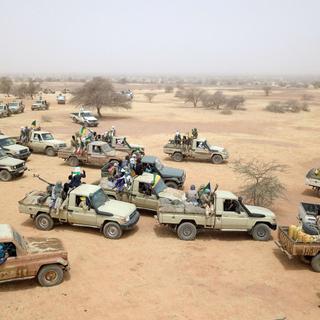


The fading of Algeria's star in the Sahel region
In DepthFollowing the withdrawal of France's Operation Barkhane, Algeria is being challenged on its southern borders by Sahelian sovereigns seeking to free themselves from its influence.
"Total liberation of Azawad." That this slogan to the glory of Azawad, the name given to northern Mali by its inhabitants, was launched from Tin Zaouatine is not insignificant. This hamlet in the heart of an expanse of sand has become a hotspot on the Sahel-Saharan strip, on the border between Mali and Algeria, a focal point for ongoing regional reconfigurations. On November 30, 2024, a spokesman for the (mostly Tuareg) rebellion fighting against the Malian authorities read out a statement, announcing the merger of pro-independence armed groups in northern Mali into a new movement – the Azawad Liberation Front (FLA).
The event marked an escalation of the separatist insurgency in northern Mali – which, after the signing of the 2015 Algiers peace agreement, regained momentum with Assimi Goïta's sovereignist junta coming to power in 2020 – even as jihadists linked to al-Qaeda and the Islamic State (IS) remain active there. The day after the creation of the FLA, a strike by a Turkish drone carried out by the Malian army killed eight Tuareg rebel leaders – all just a few kilometers from Algerian border guards monitoring the rising tensions around Tin Zaouatine through their binoculars. "Malian army drones fly over the area every day," said one local resident. The Azawad insurgents, however, are holding their ground. On July 27, they inflicted a humiliating defeat on Bamako's troops backed by mercenaries from the Russian paramilitary Wagner Group, killing 47 Malian soldiers and 84 Russians, according to the rebels' balance sheet.
To say that Algeria is alarmed by the return of war to its Sahelian borders would be an understatement. The growing instability illustrates both the erosion of its influence, when it had long regulated conflicts on its southern borders through mediation and the indisputable role it continues to play there, geographically speaking. With its 460km of border shared with Mauritania, 1,300 km with Mali, 950 km with Niger and 980 km with Libya, Algeria occupies a central position. But gone are the days of the 1960s and 70s, when it projected the prestige of its flamboyant Third-Worldism.
You have 89.41% of this article left to read. The rest is for subscribers only.
